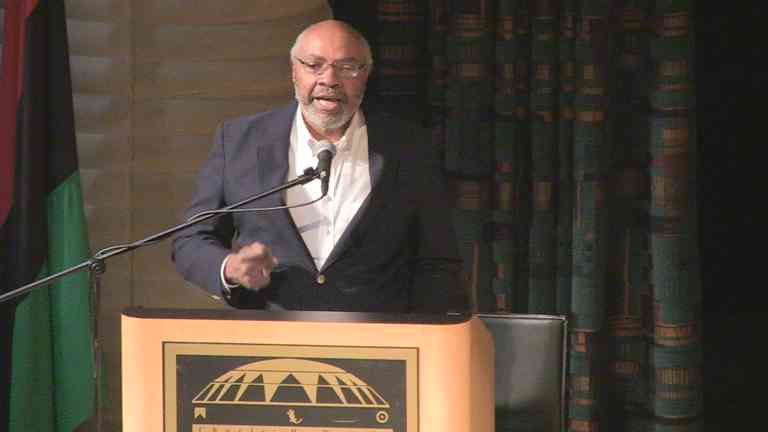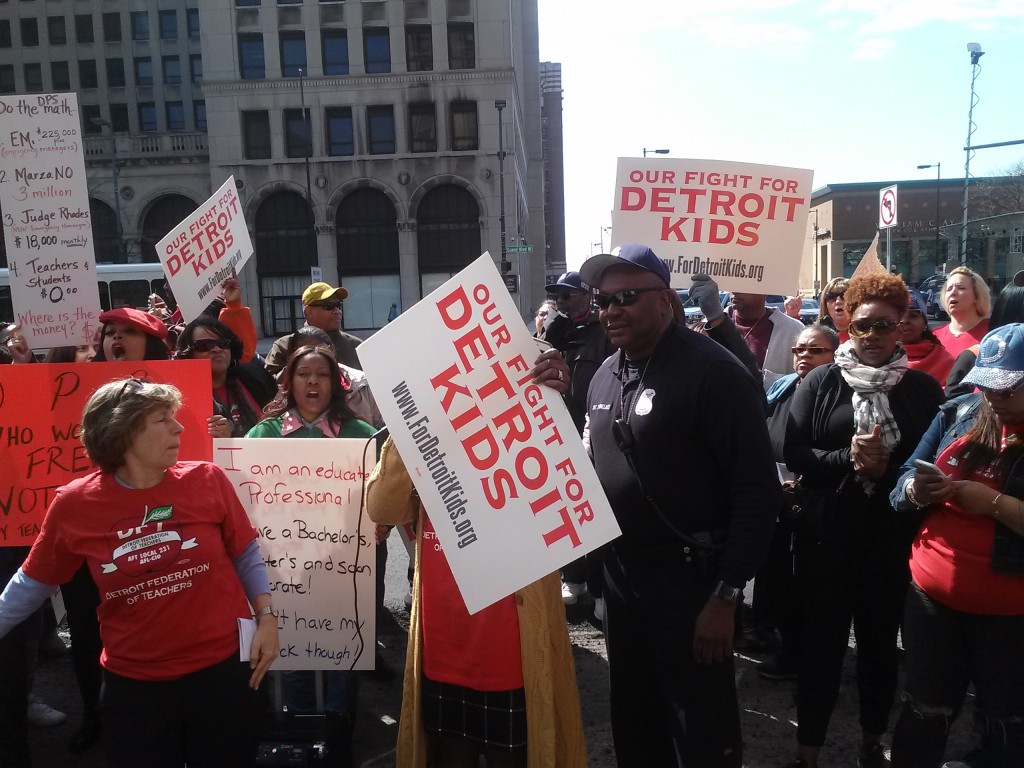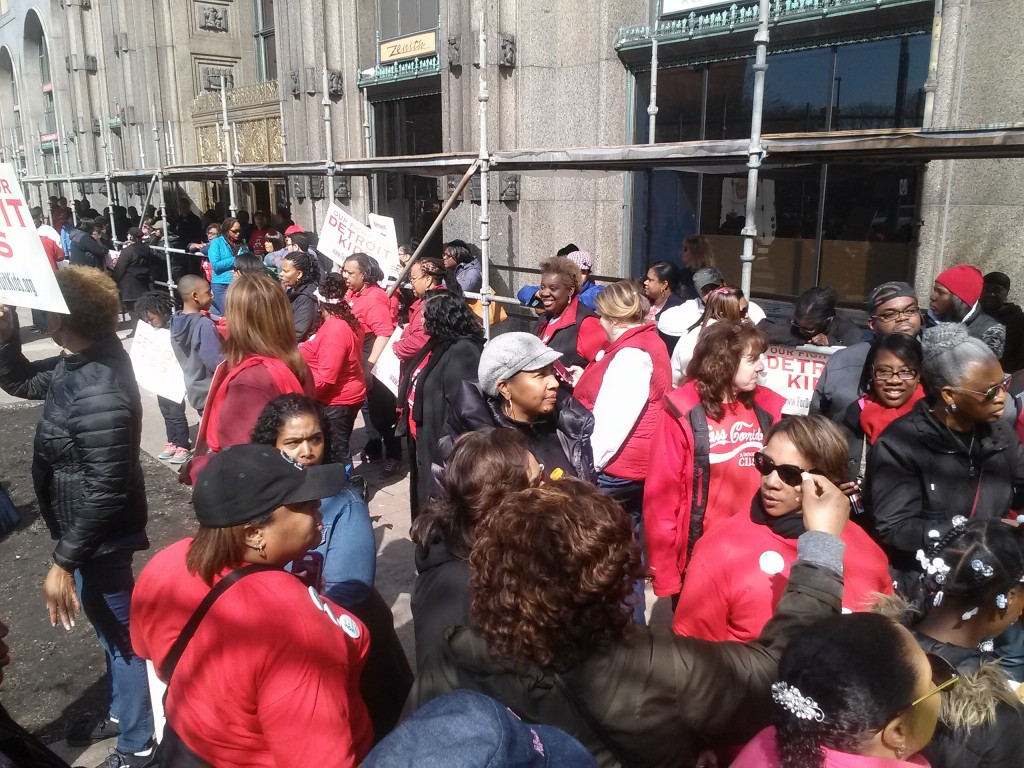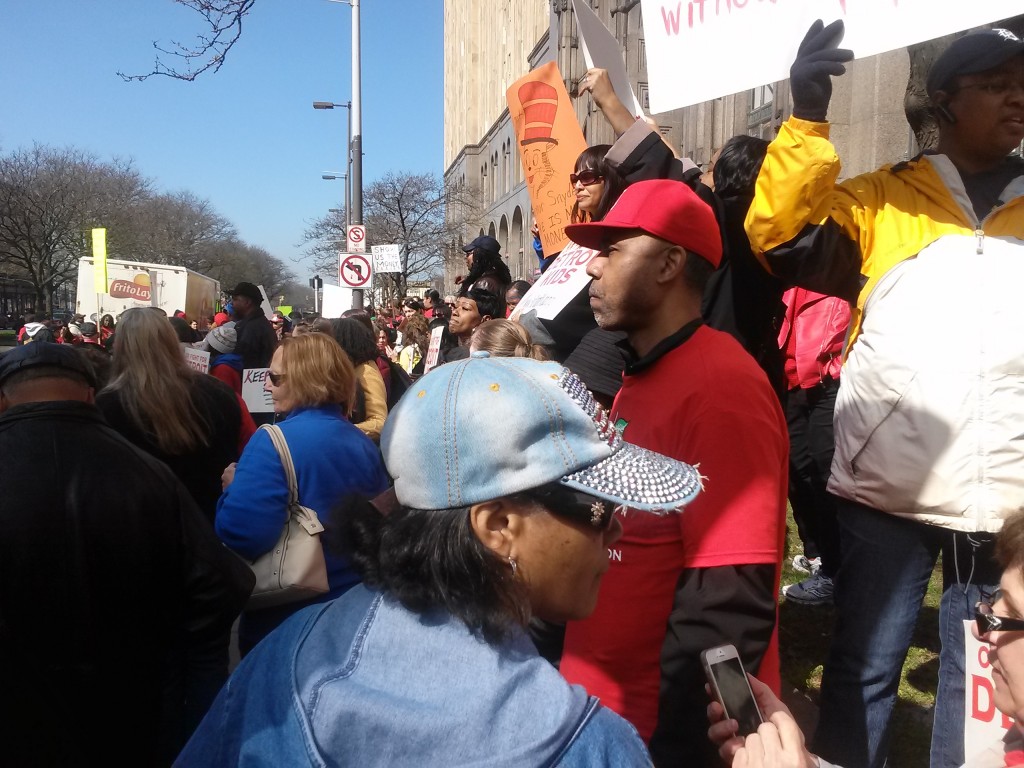|
Corporate-controlled and state-run model fails students, parents, community and educators
A two day strike organized by the Detroit Federation of Teachers (DFT) on May 2-3 which shutdown the Detroit Public Schools (DPS) represented another major development in the ongoing struggle over the future of education in the city.
Teachers and other education workers were told during the final week of April that there would be no money to pay them after June 30. Several thousand members of the DFT and other unions picketed outside the DPS headquarters in the New Center area many of whom held signs demanding an audit of the district’s finances.
 Abayomi Azikiwe at ASALH The state-administration of the DPS since 1999 has driven the system into fiscal ruin. Estimates of debt range from $500 million to $3.5 billion.
Additional reports in April indicated that up to $30 million scheduled to be deposited in pension funds were withheld. Since 2009, teachers have faced pay and benefit cuts along with massive lay-offs.
State Education Bills Designed to Continue Unequal Treatment
Two sets of legislation being debated in the state capitol in Lansing will not address the fundamental problems within the DPS. None of the initiatives returns total control of the Detroit district back to its original form prior to the state takeovers that began seventeen years ago.
 Abayomi Azikiwe Photos at DFT Second Day Strike, May 3, 2015 The House and Senate have Republican majorities which limits the ability of Democratic legislators representing Detroit and other urban districts from having any real influence over policy decisions. The passage of six House bills on May 5 provides an illustration of the political attitudes prevailing in Lansing in relationship to affairs of the city of Detroit and its school district.
These measures call for the breaking up of the DPS into two districts, one declared “free” of the corporate and state-generated debt and another established to pay-off these onerous financial obligations. In addition to the fiscal aspects of the legislation a series of punitive actions, labeled as “reforms”, would be mandated by the new laws.
 Abayomi Azikiwe Photos at DFT Second Day Strike, May 3, 2015 According to Mlive.com, “The legislation includes a host of reforms, both academic and financial, nearly all of which were opposed by Democrats. Among them: Prohibiting existing union contracts at DPS from being transferred to the new district, paying teachers based on performance and allowing the hiring of non-certified teachers.” (May 5)
This same report goes on to note that “The package also strengthens penalties against teachers who participate in strikes. The component was added to the final version of the legislation after sick-outs staged by DPS teachers — in protest to news they wouldn’t be paid for work they had already completed — virtually brought the district to a halt.”
 Abayomi Azikiwe Photos at DFT Second Day Strike, May 3, 2015 Under this scheme the school board would return to a locally elected body by Jan. 1, 2018 and a 7-member interim board would serve until then, appointed by the Detroit Mayor, who would appoint two members while the Governor could appoint five. The interim board will install a superintendent while a financial review commission would have oversight over the district.
Nonetheless, two pieces of legislation advanced by the State Senate calls for another form of reorganization through SB 710 and 711. This legislation is supported by Detroit Mayor Mike Duggan, the first corporate-oriented white city chief in over forty years.
Senate Bills 710 and 711 creates a so-called Detroit Education Commission (DEC) which would consolidate K-12 education under a mayoral-administered model reigning in even charter schools. This alternative legislation is supported by the Coalition for the Future of Detroit Schoolchildren, an alliance consisting of corporate leaders, Duggan, some churches, the Michigan Federation of Teachers (MFT) and other unions.
The DEC would effectively eliminate the existing elected Detroit Board of Education which is powerless under the emergency management system that was imposed by former Democratic Governor Jennifer Granholm in 2009. Successive emergency managers have been appointed by both Granholm and Snyder over the last seven years precipitating a worsening decline in the financial health and academic capacity of the district.
Advocates of the DEC opposed the bills passed by the State House on May 5 which excluded any input from the minority Democratic legislators. Nonetheless, advocates for charter education hailed the House bills because they did not include any language related to containing and holding these schools accountable.
Mlive.com emphasized that “Democrats were unanimous in their opposition, saying the funding falls well short of the Senate’s bipartisan rescue package, which totaled $715 million. They said without the necessary dollars, DPS could be back before the legislature in the next few years seeking additional funding.”
“We all agree that the state needs to take responsibility and fix the issues in DPS,” state Rep. Brian Banks, D-Detroit, chairman of the Detroit Caucus, said in a press release. “That’s why I’m baffled that House Republicans chose to reject our input and continue on the same course that got us here in the first place.” (Mlive.com, May 5)
The Role of Rhodes
Retired federal judge Steven Rhodes was appointed earlier in the year as a “transition manager” over the DPS. Rhodes oversaw the City of Detroit bankruptcy and his presence suggests an opening for the same process in DPS with the potential for the massive theft of pensions and public assets as was carried out against municipal retirees in 2013-14.
Rhodes role in the Detroit bankruptcy, the largest in United States history, was aimed at providing a legal rationale for placing the burden of the bank and bond debt on the retirees who were subjected to the discharging of $6.5 billion in pension and healthcare obligations.
Other plans aimed at the continued disempowerment of residents consisting of the creation of a DEC that would facilitate the consolidation of schools citywide, where an even more centralize system of contract allocation and privatization could be facilitated, may not be adequate as far as the Republican-dominated legislature and gubernatorial office is concerned.
Teachers, Students and Community Fight Back
Since the beginning of the year, teachers, parents, students and community people have engaged in various forms of protest against the escalating crisis.
These difficulties stem directly from the interference in the governance of the DPS by successive Republican and Democratic administrations in Lansing and the failure of the federal government to provide adequate support for the overwhelmingly majority African American students who attend educational institutions around the city.
The two major sets of bills ostensibly designed to stave off total collapse are still being debated in Lansing yet neither pieces of legislation offer any real prospect of renewal. A systematic review of the debt and the role of the financial institutions would be a tremendous contribution to uncovering the real source of DPS fiscal crisis.
As with the City of Detroit, the banks and corporate entities view municipal governments and school districts as a source of exploitation. While the capitalist class grows wealthier in the U.S., cities such as Detroit have become a center for concentrated poverty and underdevelopment.
These problems involving education in Detroit are mirrored through other systems such as Chicago where teachers have also taken to the streets over the last four years. Teachers in Chicago staged a one-day strike on April 1 demanding that the Illinois state legislator appropriated adequate funding to meet the needs of students and educators.
However, most politicians within state and federal offices work on behalf of corporate interests that are anti-union and categorically opposed to any form of self-rule and self-determination within the cities. A program of equal funding and local control advanced by the unions, community organizations, students and parents would place the focus on demanding that state and federal governments provide adequate resources for the maintenance and improvement of public education.
|